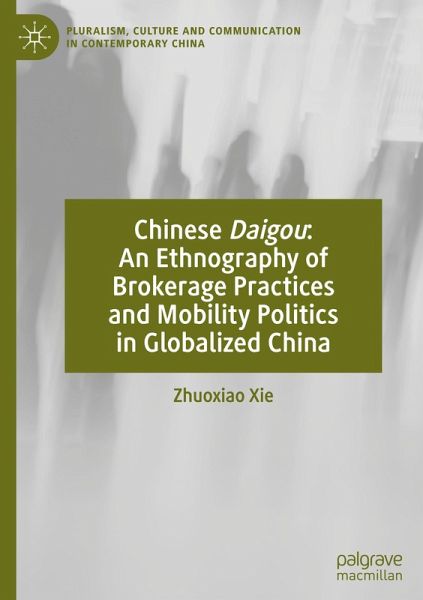
Chinese Daigou: An Ethnography of Brokerage Practices and Mobility Politics in Globalized China

PAYBACK Punkte
53 °P sammeln!
This book is an ethnography of Chinese daigou (cross-border shopping on the behalf of mainland Chinese customers) and their mobilities practices. Daigou practitioners, predominantly women, engage in selling, purchasing, and delivering goods between mainland China and overseas regions. With the rise of the platform economy and mobile technologies, daigou has evolved into a niche market, contributing to the "her economy" and consumerism in China. This ethnography provides a comprehensive exploration of the gendered-technological practices of mobile communication and mobility politics between mai...
This book is an ethnography of Chinese daigou (cross-border shopping on the behalf of mainland Chinese customers) and their mobilities practices. Daigou practitioners, predominantly women, engage in selling, purchasing, and delivering goods between mainland China and overseas regions. With the rise of the platform economy and mobile technologies, daigou has evolved into a niche market, contributing to the "her economy" and consumerism in China. This ethnography provides a comprehensive exploration of the gendered-technological practices of mobile communication and mobility politics between mainland China and Hong Kong, depicting micro-entrepreneurship, place-making, and border-crossing activities in three intersecting scenes. Theoretically, this book synthesizes the literature on mobilities, science and technological studies, service labor, and mobile communication. It offers a fresh perspective by focusing on the (mobile) communication that both produces and is produced by mobilities of people, data, objects, and technologies. The study expands theories of mobility politics by developing a heuristic model of brokerage, theorizing the communication processes through which daigou, as brokers, influence, manage, or facilitate multiple forms and meanings of mobilities in globalized China.
From a feminist science and technology perspective, the book examines how daigou scenarios embed gender-specific concepts into technological practices, reinforcing entrenched unequal gender relations in service labor and family contexts. It interrogates the mechanisms of unequal mobilities associated with the logic of brokerage, which strengthens the differentiation of gender, technology, and labor among different parties. These brokerage processes multiply the discrepancies in mobilities, exacerbating gaps in structural relationships and becoming significant mechanisms of inequality.
From a feminist science and technology perspective, the book examines how daigou scenarios embed gender-specific concepts into technological practices, reinforcing entrenched unequal gender relations in service labor and family contexts. It interrogates the mechanisms of unequal mobilities associated with the logic of brokerage, which strengthens the differentiation of gender, technology, and labor among different parties. These brokerage processes multiply the discrepancies in mobilities, exacerbating gaps in structural relationships and becoming significant mechanisms of inequality.














